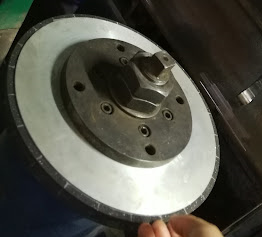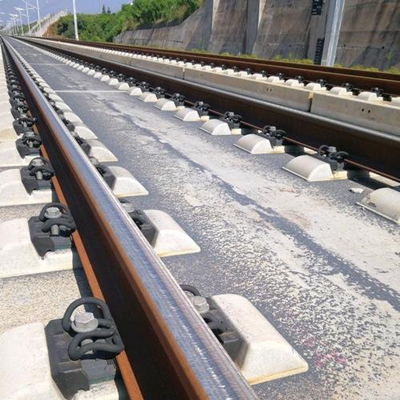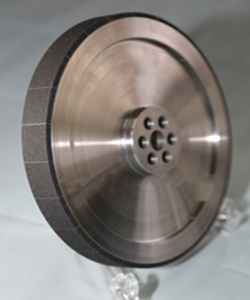Application of diamond grinding wheel in high speed railway track plate processing
The rail plays the role of guiding the vehicle and transmitting the load to the subgrade. After the high-speed and heavy-duty railway was put into operation, various surface injuries of rail appeared, such as corrugation wear of rail, abrasion of rail surface, strip of rail surface, severe wear of rail side, crack and crush of rail head, etc. And the development speed was fast, which affected the railway transportation capacity and economic benefit.
Ballast track is concrete or asphalt mortar to replace loose ballast and composed of track structure type, it has the characteristics of high track stability, good stiffness uniformity, strong structure durability and less maintenance work, for high-speed railway has a better adaptability than the traditional ballast track. Of slab without a frantic jumble track research in China is carried out along with the continuously go deep into the research of high speed railway, high-speed railway track plate is no ordinary concrete products, because of the complexity of the track plate used in concrete and the track plate size is relatively strict, must ensure that the support rail grinding machine precision steel erection error is less than 0.3 mm. Therefore, high requirements are put forward for the tool manufacturing industry.
Structure and manufacture of special grinding wheel for track plate processing:
For the processing of high-speed rail Borg track plate, most of the equipment used depends on imported, CRTSll type track plate special CNC grinder, special grinder with grinding wheel specification D550×H200×T304, the surface roughness of the track plate is required Rz=50 ~ 70µm, grinding allowance is 2mm, Because the surface roughness of the rail plate bearing platform is not high and the grinding allowance is large, the grain size of the diamond grinding wheel used is selected as 40-50#, and the grinding wheel matrix is forged with 20CrMo steel.
China’s current grinding operation methods and tools, often using the most conservative traditional zirconium corundum grinding wheel envelope grinding method, and this way can not fully play the advantages of rail grinding technology.
At present, the general way of domestic rail grinding is that the special grinding train is equipped with 48-96 resin grinding wheels, that is, each side of the rail is allocated 48, arranged in the rail profile section -70 degrees until +20 degrees at different positions. Because the working sequence of grinding wheel has an impact on the grinding of rail profile, the grinding wheel is generally arranged in the order of the outer side of the rail — the inside of the rail — the top of the rail — shaping. The grinding capacity of the track in a single trip is 0.2-0.3mm, the grinding speed of the train is 8-25km /h, and the grinding wheel needs to be replaced at about 60-100km. The advantages of this process are that the profile can be repaired, the serious diseases can be removed, the operating range is wide and the technology is mature. However, this technology also has the following drawbacks:
(1) Easy to damage rail, equipment and control system is complex, grinding speed is slow.
(2) High consumption of grinding wheel and high economic cost.
(3) Grinding heat, as a binder phenolic resin local cracking, a certain amount of toxic and harmful gas, and large heat will make the rail surface to produce a certain thickness of thermal stress layer, affecting the fatigue life of rail material.
(4) During the grinding process, the abrasive rapid crushing and the shedding of resin binder together produce a large amount of dust, especially in the grinding of culverts and valleys and other poorly ventilated section rail, dust content will even reach 3000mg/m3, serious environmental pollution.
High efficiency long life vitrified & resin composite CBN rail grinding wheel. The new superhard material cubic boron nitride (CBN) is used to replace the traditional zirconium corundum material as the main abrasive of the grinding wheel. The CBN and the special nanocrystal reinforced ceramic bond for CBN are mixed, pressed, and sintered to form the grinding block material. CBN grinding block is cemented on the surface of grinding wheel by resin according to the mechanical design arrangement law, and then the grinding wheel is processed on the surface to obtain the final product.

Compared with traditional corundum grinding wheel, the advantages of new ceramic resin composite CBN rail grinding wheel are mainly reflected in the following points:
(1) The new superhard material CBN is used as the main abrasive of the grinding wheel, whose hardness is equal to 2 times of the hardness of corundum, and the grinding efficiency is more than 3-4 times of the ordinary grinding wheel, which can greatly improve the working speed of the grinding car.
(2) The service life of CBN grinding wheel can reach 20-40 times of ordinary grinding wheel, and the replacement frequency is low in the grinding process, which reduces the working intensity of the operator; The grinding wheel has small abrasion and low dust concentration per unit kilometer, which can solve the environmental problem of dust exceeding standard when the traditional grinding wheel is working.
(3) The thermal conductivity of CBN grinding wheel is 45 times that of corundum, the heat generated in the grinding process is less, and the resin will not crack to produce harmful gas. At the same time, the grinding rail is not easy to produce grinding burn cracks, which can extend the service life of the rail by 20-30%.


